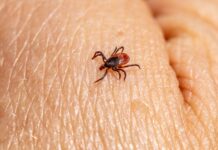Greater global interconnectivity means greater vulnerability to pandemics. This is no news to anyone living through the COVID-19 crisis, and we are now seeing just how fragile our system is when a new infectious disease emerges.
Kamran Khan has been aware of this fragility for some time. He’s an infectious disease specialist at St. Michael’s Hospital who was inspired to start the outbreak surveillance company, BlueDot, following his experience of the 2003 SARS outbreak.
“What I learned during SARS is, let’s not get caught flatfooted, let’s anticipate rather than react,” Khan said to CNBC. “If we rely on government agencies to report information about infectious disease activity, we may not always get that in the most timely way or as quickly as we would like.”
COVID-19’s rise from distant phenomenon to our ‘new normal’ wasn’t a total surprise for BlueDot. Towards the end of last year, the Toronto-based company alerted customers about an “unusual pneumonia” gathering pace in Wuhan. They were quicker to the mark than anyone else; even the US Centers for Disease Control called it nine days later on Jan. 6.
As the crisis was forming, BlueDot correctly identified the 11 cities which would be hit first outside of Wuhan. Khan has acknowledged that when they sounded the alarm, they didn’t anticipate how powerful the outbreak would become, but they knew it had the potential.
This isn’t the first time BlueDot was ahead of the curve with impending outbreaks. They called the Zika virus months ahead of the authorities and predicted its spread from South America into the United States via Florida.
At the heart of the fight against COVID-19
Now, the Canadian government has enlisted their help, and the company’s work has landed them a place helping with the decision-making and policy. They’re helping with resource allocation, measuring the efficacy of social distancing, and assessing how the public is responding to health advice (partially by using anonymous location data from millions of mobile data sources).
When the current outbreak subsides, they’ll continue to monitor trends inside and outside the country and act as an early warning system so we don’t end up reimporting the disease.
“BlueDot is humbled and grateful for the opportunity to combine our expertise in infectious diseases, big data analytics, and digital technologies with the efforts of the government of Canada to protect lives and mitigate the impacts of COVID-19 here at home and around the world,” said Khan in an emailed press release.
How do they do it?
The group’s secret weapon is their AI, which crunches huge volumes of data using machine learning and natural language processing to track over 150 diseases. Data from 100,000+ sources are used, including digital media produced in 65 languages, public health organization statements, livestock health reports, population demographics, and global airline ticketing data, while noise from social media is excluded.
Every 15 minutes, 24 hours a day, the numbers are processed.
After the AI consolidates and analyzes the data and produces a report, the human element enters. A diverse team of experts reviews the report and decides what trends merit further investigation, and the final report is then sent on to customers.

Software developers, designers, veterinarians, doctors, epidemiologists, and engineers are among the talent you can find on the team. In Khan’s words, their professional diversity reflects the multi-faceted nature of the problems they tackle: “We’re a deliberately eclectic group of people because the problem we are tackling is diverse,” said Khan to the Economist.
The 40-person strong team is currently hiring for a range of positions such as marketing, data analysis, and business development.
A growing need for systems to manage our new normal
These groundbreaking times are fast becoming a catalyst for BlueDot’s philosophy of vigilance and preparedness when it comes to pandemics.
As Khan concludes: “We are in uncharted territory as a microscopic virus is now disrupting our entire planet. The COVID-19 pandemic has revealed the need to implement systems that proactively manage infectious disease risks which, in our rapidly changing world, are increasing in frequency, scale and impact.
“And it is with enhanced preparedness that we can get ahead of these threats to create a healthier, safer, and more prosperous world.”





































